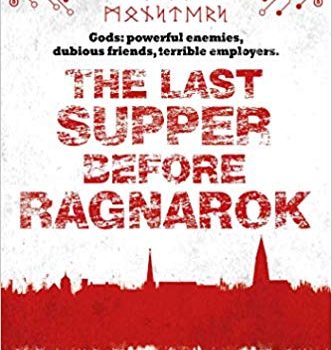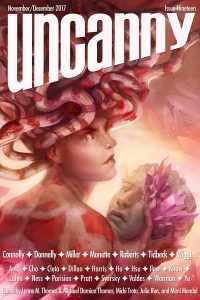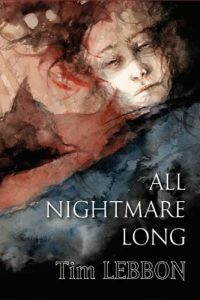Katharine Coldiron Reviews The Last Supper Before Ragnarok by Cassandra Khaw
 The Last Supper Before Ragnarok, Cassandra Khaw (Abaddon Books 978-1-78108-645-2, $11.99, 352pp, pb) June 2019.
The Last Supper Before Ragnarok, Cassandra Khaw (Abaddon Books 978-1-78108-645-2, $11.99, 352pp, pb) June 2019.
What an odd book Cassandra Khaw has written. It’s extraordinarily immediate, inherently diverse, jammed with whip-fast wisecracks, and peppered with language so precise and sophisticated it awes. But the book is also chaotic, unevenly characterized, and weakly plotted. The difficulty comes in judging the book as a whole, because its elements divide so steeply between exceptional and inadequate.
The Last Supper Before Ragnarok is Khaw’s second full-length book about Rupert Wong. The first, Food of the Gods, collects two novellas previously published separately about the character: Rupert Wong, Cannibal Chef and Rupert Wong and the Ends of the Earth. Last Supper evidently begins right where Food of the Gods left off, because it opens with a scene in which Rupert and Fitz, a prophet whose character is never fully fleshed out in this installment, are mid-conversation. Hardly anything they’re saying makes sense to those who haven’t read the prior adventure, and the book moves forward at top speed from there. It’s hard to get a grip at any time.
The plot has to do with gathering up a group of supernatural creatures to keep the father gods from filling the vacuum in the universe created by the events of the prior book. One of the main characters, Amanda, is a new god: of the internet. Amanda will be used for evil purposes if the assembled group of supers fails to stop the father gods, e.g. Odin, Ra, Zeus – old, old gods of vanished cultures. Ultimately, they look up Coyote (a trickster, as incorrigible and compelling in Khaw’s imagining as any author has ever made him), and figure out a way to save the world.
This summary may seem confusing or bare-bones, but that is how the plot feels to the reader unfamiliar with Rupert’s world. The book rushes along from one location to the next, one “what do we do now?” after another, and expository conversations don’t clarify much beyond the next page’s narrative requirements. It’s possible that without reading Food of the Gods, the reader altogether misses out on the complexity of the larger plot arc; it’s also possible that the plot is really thin.
Despite the sense of muddling through a half-understood book, reading The Last Supper Before Ragnarok is a terrific experience. It’s an excessively talky book, almost totally composed of conversations, but the chatter has that whirling, hyper-fun Whedonesque feel, as if the reader is walking along behind the popular kids, trying to keep pace. And Khaw has a poet’s ear for language: “I say nothing for the pour of a minute.” “Life drags me back, upwards, through the laminae of realities, all the worlds in between blurred into neon glare.” “Coyote is angry: a brittle, sugar-glass emotion, like the veneer that is starting to break. The woods become fields, far as forever, dark honey in the storm-light.”
Additionally, there is Amanda, the personification of the internet, which – no fiction about this – has rapidly gained importance as a powerful, holy figure. A multiply cloned body with a cloud-based intelligence, Amanda is a remarkably innovative creation. Logical trains of thought about what the embodied internet would look like join with Khaw’s own ideas to form a truly new and interesting creature: “Amanda is a composite image. She’s a Google Search’s worth of faces melted together, every stock image of ‘office secretary’ and ‘yoga mom’ blended into a single discrete whole.”
Other characterization is less thorough. Fitz was presumably better explained in the first book, because it’s tough to get a handle on who he is and what his capacities are. Tanis, a hybrid snake-woman, is repeatedly propped up as an utter badass, but her powers almost never appear at center stage. As for Cason, the descendant of the Devil, it seems like Khaw was trying to play on reader expectations by making him a harmless suburban dad, but the full implications of that play remain murky.
Again, The Last Supper Before Ragnarok is an enjoyable, immersive, unusually language-focused book. Reading it is never dull, but the nagging question beneath that entertainment is whether the noise and distraction of the action scenes, the wit and thrust of the dialogue, and the speed with which the characters barrel toward their final confrontation serve to distract from a rickety narrative foundation – whether this book prizes the clever over the considered.
Katharine Coldiron is the author of Ceremonials (Kernpunkt Press), an SPD fiction bestseller. Her work as a book critic has appeared in The Washington Post, The Believer, The Guardian, and many other places. She lives in California and at kcoldiron.com.
This review and more like it in the October 2019 issue of Locus.
 While you are here, please take a moment to support Locus with a one-time or recurring donation. We rely on reader donations to keep the magazine and site going, and would like to keep the site paywall free, but WE NEED YOUR FINANCIAL SUPPORT to continue quality coverage of the science fiction and fantasy field.
While you are here, please take a moment to support Locus with a one-time or recurring donation. We rely on reader donations to keep the magazine and site going, and would like to keep the site paywall free, but WE NEED YOUR FINANCIAL SUPPORT to continue quality coverage of the science fiction and fantasy field.








